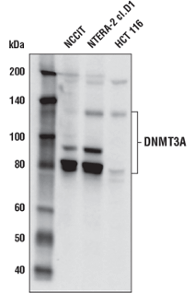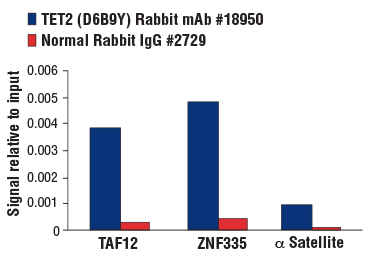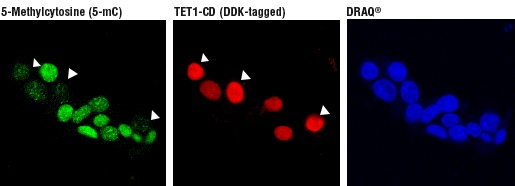Myelodysplastic Syndrome (MDS) and Acute Myeloid Leukemia (AML)
DNA methylation at cystosine residues is a crucial epigenetic modification that regulates gene expression to control cell proliferation and differentiation. Dysregulation of this methylation due to overexpression of DNMT3A or inactivation of TET2 can result in aberrant regional DNA hypermethylation. This drives myelodysplastic syndrome (MDS) and acute myeloid leukemia (AML) pathogenesis by transcriptionally repressing tumor suppressor genes or by displacing CTCF proteins, resulting in aberrant expression of oncogenes.
Start with these targets
DNMT3A
DNMT3A is a methyltransferase that is often mutated in MDS/AML.
Products
DNMT3A (D2H4B) Rabbit mAb #32578 – WB, IP, IHC, IF, F
Western blot analysis of extracts from NCCIT, NTERA-2 cl.D1, and HCT 116 cells using DNMT3A (D2H4B) Rabbit mAb. This antibody detect multiple isoforms of DNMT3A, including isoforms 1 and 2.
DNMT3A (D23G1) Rabbit mAb #3598 – WP, IP, IHC
TET2
Inactivation of the methyltransferase TET2 is one of the most frequent drivers of MDS/AML.
Products
TET2 (D6B9Y) Rabbit mAb #18950 – WB, IP, ChIP
Chromatin immunoprecipitations were performed with cross-linked chromatin from 293T cells and either TET2 (D6B9Y) Rabbit mAb or Normal Rabbit IgG #2729 using SimpleChIP® Plus Enzymatic Chromatin IP Kit (Magnetic Beads) #9005. The enriched DNA was quantified by real-time PCR using SimpleChIP Human ZNF335 Promoter Primers #25946, human TAF12 exon1 primers, and SimpleChIP Human α Satellite Repeat Primers #4486. The amount of immunoprecipitated DNA in each sample is represented as signal relative to the total amount of input chromatin, which is equivalent to one.
TET2 (D9K3E) Rabbit mAb (Mouse Specific) #92529 – WB, ChIP, ChIP-seq
TET2 (D6C7K) Rabbit mAb (Mouse Specific) #36449 – WB, IP, IF, F
5-mC and 5-hmC
Watch out for changes in levels of 5-methylcytosine (5-mC) and 5-hydroxymethylcytosine (5-hmC), resulting from overexpression of DNMT3A or inactivation of TET2.
Products
5-Methylcytosine (5-mC) (D3S2Z) Rabbit mAb #28692 – IF, Dot Blot, MeDIP
Confocal immunofluorescent analysis of 293T cells transfected with a construct expressing DYKDDDDK-tagged TET1 catalytic domain (TET1-CD) using 5-Methylcytosine (5-mC) (D3S2Z) Rabbit mAb (green) and DYKDDDDK Tag (9A3) Mouse mAb #8146 (red). Blue pseudocolor = DRAQ5 #4084 (fluorescent DNA dye). As expected, 293T cells expressing TET1-CD (red) exhibit decreased levels of 5-methylcytosine (green).
5-Hydroxymethylcytosine (5-hmC) (HMC31) Mouse mAb #51660 – IF, Dot Blot, hMeDIP




